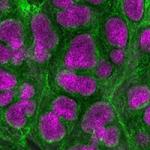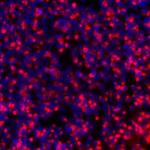
Carol J. Thiele, Ph.D.
Senior Investigator
Pediatric Oncology Branch
NCI/CCR
Acting Co-Director
NCI/CCR
Research Topics
Cell and Molecular Biology Section
Every year approximately 700 cases of neuroblastoma (NB) and 210 cases of Ewings' sarcoma (EWS) are diagnosed in children less than 20 years of age. Half will fail conventional therapy. Despite the progress made in the development of clinical/genetic-based staging systems for NB and EWS the prognosis for patients with unfavorable disease remains dismal. The focus of the Cell and Molecular Biology Section has been to develop a comprehensive understanding of the biology of peripheral neuroectodermal tumors cells. We do so by developing in vitro and in vivo modeling systems that will enable genetic interrogation of the biologic systems of tumor cells and their normal counterparts. The insights gained from these studies serve as a platform for the development of novel therapies for the treatment of children with these diseases.
A number of genetic alterations have been identified in neuroblastoma tumors which are thought to contribute to tumorigenicity. Despite these genetic alterations, retinoids (derivatives of Vitamin A) are capable of arresting cell growth, inducing differentiation and suppressing tumorigenicity. Thus by activating alternative intracellular signaling programs we may be able to bypass genetic defects and restore growth control and induction of differentiation.
Project I: The BDNF/TrkB/PI3-Kinase/AKT Pathway Is Important in the Survival and Metastatic Capability of NB Tumor Cells.
The specific aims of this project are:
- To identify and characterize the molecular mechanisms mediating these processes; and
- To evaluate the therapeutic potential of targeting downstream signaling intermediaries of the PI3-Kinase/AKT pathway to enhance chemosensitivity and inhibit metastasis and angiogenesis.
Project II: Clinical, Histopathologic and Genetic Evidence Indicates that Alterations in the Regulation of Normal Development Contribute to NB Tumorigenesis.
The specific aims of this project are:
- To identify and characterize NB tumor-initiating cells/cancer stem cells;
- To identify the epigenetic pathways dysregulated in NB by using chemical and siRNA screens to identify comounds that target these epigenetic pathways; and
- To study the epigenetic mechanisms regulating NB differentiation by using chemical and small molecule screens to identify agents that stimulate differentiation.
Biography
Dr. Thiele received her Ph.D. in Microbiology and Immunology from the University of California, Los Angeles. She completed her postdoctoral research as a Cancer Research Institute and a Damon Runyon-Walter Winchell Fellow at the NCI. Dr. Thiele was one of the founding editors of Cell Death & Differentiation, and has served on the editorial boards of Cell Death & Differentiation, Cancer Research and Molecular Cancer Therapeutics. Dr. Thiele was Chair of the AACR Women in Cancer Research and has a long-standing interest in developing programs so that young scientific investigators can realize their potential. As the Chief of the Cell and Molecular Biology Section in the Pediatric Oncology Branch, Dr. Thiele's scientific interest is in the field of cancer biology with a special emphasis on pediatric neuroectodermal tumors and neuronal development. She has been involved in the organization of the Advances in Neuroblastoma Research Association (ANRA). Her research strives to understand molecular mechanisms involved in the pathogenesis of neuroblastoma tumors and utilizes insights gleaned from these studies to develop novel therapeutic strategies for pediatric tumors.
Selected Publications
- Veschi V, Liu Z, Voss TC, Ozbun L, Gryder B, Yan C, Hu Y, Ma A, Jin J, Mazur SJ, Lam N, Souza BK, Giannini G, Hager GL, Arrowsmith CH, Khan J, Appella E, Thiele CJ. Epigenetic siRNA and Chemical Screens Identify SETD8 Inhibition as a Therapeutic Strategy for p53 Activation in High-Risk Neuroblastoma. Cancer Cell. 2017;31(1):50-63.
- Liu Z, Li W, Ma X, Ding N, Spallotta F, Southon E, Tessarollo L, Gaetano C, Mukouyama YS, Thiele CJ. Essential role of the zinc finger transcription factor Casz1 for mammalian cardiac morphogenesis and development. J Biol Chem. 2014;289(43):29801-16.
- Wang C, Liu Z, Woo CW, Li Z, Wang L, Wei JS, Marquez VE, Bates SE, Jin Q, Khan J, Ge K, Thiele CJ. EZH2 Mediates epigenetic silencing of neuroblastoma suppressor genes CASZ1, CLU, RUNX3, and NGFR. Cancer Res. 2012;72(1):315-24.
- Li Z, Jaboin J, Dennis PA, Thiele CJ. Genetic and pharmacologic identification of Akt as a mediator of brain-derived neurotrophic factor/TrkB rescue of neuroblastoma cells from chemotherapy-induced cell death. Cancer Res. 2005;65(6):2070-5.
- Thiele CJ, Reynolds CP, Israel MA. Decreased expression of N-myc precedes retinoic acid-induced morphological differentiation of human neuroblastoma. Nature. 1985;313(6001):404-6.
Related Scientific Focus Areas
This page was last updated on Monday, February 3, 2025




